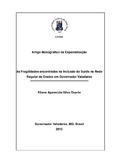| dc.contributor.advisor | Pereira, Michele Quinhones | |
| dc.creator | Duarte, Eliane Aparecida Silva | |
| dc.date.accessioned | 2016-05-12T11:44:46Z | |
| dc.date.available | 2016-05-12T11:44:46Z | |
| dc.date.issued | 2010 | |
| dc.date.submitted | 2010 | |
| dc.identifier.uri | http://repositorio.ufsm.br/handle/1/1588 | |
| dc.description | Artigo (especialização) - Universidade Federal de Santa Maria, Centro de Educação, Curso de Especialização em Educação Especial - Déficit Cognitivo e Educação de Surdos, EaD, RS, 2010. | por |
| dc.description.abstract | This article is part of an investigation into the weaknesses in the process of inclusion of deaf people in
mainstream education in municipal schools and private Governador Valadares. For both were involved teachers
of deaf students who participated in semi-structured interview in which the statements were analyzed. The data
indicated weaknesses that occur in the school identified as deaf as ignorance on the subject of a different culture,
thus causing a reductionism of the educational implications of the right of the interpreter and the use of sign
language between it and the deaf students. The difficulty of interaction between teacher and deaf is another
weakness, because the teacher did not dominate the LS has just transferred its role as intervenor in the process of
teaching and learning for the interpreter recognizes the uncertainty about the role of different actors involved.
They also highlight difficulties with curriculum adaptations, active participation of the deaf with respect to
literature, arts, events and activities that promote the construction of deaf identity. The reflection contributed to
rethink about inclusive practices involving the deaf, trying to identify the weaknesses in the process inclusive
and thereafter raise arguments that allow this process to rethink the organization seeking attitudes and
educational curriculum changes that actually promote inclusion of deaf students and enable them to recognition
and deaf cultural practice, constructing their identities without feeling inferior or limited compared to the listeners. | eng |
| dc.language | por | por |
| dc.publisher | Universidade Federal de Santa Maria | por |
| dc.rights | Acesso Aberto | por |
| dc.subject | Inclusão | por |
| dc.subject | Educação | por |
| dc.subject | Surdos | por |
| dc.title | As fragilidades encontradas na inclusão do surdo na rede regular de ensino em Governador Valadares | por |
| dc.type | Trabalho de Conclusão de Curso de Especialização | por |
| dc.degree.local | Polo de Governador Valadares, MG, Brasil | por |
| dc.degree.specialization | Educação Especial - Déficit Cognitivo e Educação de Surdos, EaD | por |
| dc.description.resumo | Este artigo integra uma investigação sobre as fragilidades no processo de inclusão dos surdos na rede
regular de ensino em escolas municipais e particulares de Governador Valadares. Para tanto foram envolvidos
professores de alunos surdos que participaram de entrevista semi-estruturada na qual os depoimentos foram
analisados. Os dados indicaram fragilidades que ocorrem no espaço escolar identificados como desconhecimento
sobre o surdo enquanto sujeito de diferente cultura, causando assim um reducionismo das implicações
educacionais ao direito do intérprete e a utilização da Língua de Sinais entre esse e os alunos surdos. A
dificuldade de interação entre professor e surdo é outra fragilidade, pois o professor por não dominar a LS acaba
transferindo o seu papel de interventor do processo de ensino aprendizagem para o intérprete reconhecendo a
incerteza em relação ao papel dos diferentes atores neste cenário. Os depoimentos apontam ainda dificuldades
com adaptações curriculares, participação ativa dos surdos no que diz respeito à literatura, artes, manifestações e
atividades que promovem a construção da identidade surda. Esta investigação gerou uma reflexão que contribuiu
para repensar acerca de práticas inclusivas envolvendo surdos, procurando identificar as fragilidades no processo
inclusivo e a partir daí levantar argumentos que possibilitem repensar a organização desse processo buscando
atitudes educacionais e mudanças curriculares que realmente promovam a inclusão dos alunos surdos e
possibilite a esses o reconhecimento e prática cultural surda, construindo suas identidades sem sentirem-se
inferiores ou limitados frente aos ouvintes. | por |
| dc.publisher.unidade | Centro de Educação | por |


